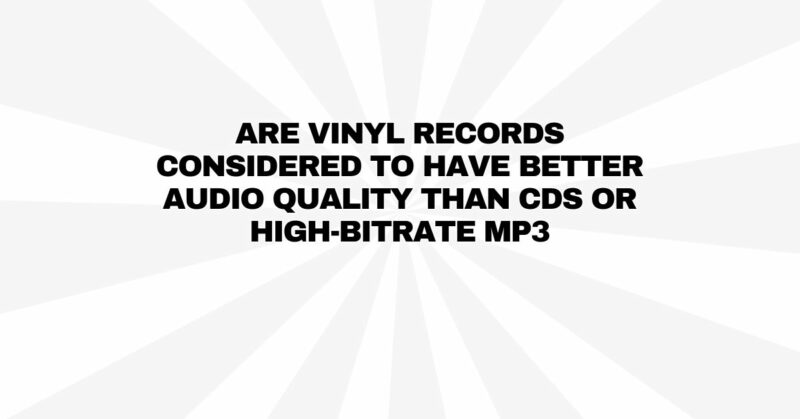The debate over audio quality in different music formats has been ongoing for years, with audiophiles and music enthusiasts passionately discussing the merits of vinyl records, CDs, and high-bitrate MP3s. Each format has its own unique characteristics, and the perception of audio quality is often subjective. In this article, we’ll delve into the factors that influence the perceived audio quality of vinyl records, CDs, and high-bitrate MP3s, and explore the arguments on all sides of the debate.
Vinyl Records: Analog Warmth and Charisma
Vinyl records are celebrated for their analog warmth and character. They offer a unique listening experience that appeals to many music enthusiasts. Here are some of the key qualities of vinyl records that contribute to their perceived audio quality:
- Analog Warmth: Vinyl records store music in an analog format, with the music physically etched onto the record’s surface as grooves. This analog process produces a warm and organic sound that is often described as having depth and character. Audiophiles appreciate this warmth, which they feel adds a level of authenticity to the music.
- Tactile Experience: Handling vinyl records and the act of playing them on a turntable contribute to the overall listening experience. The ritual of selecting a record, gently placing the needle, and observing the spinning disc creates a unique connection with the music.
- Dynamic Range: Vinyl records often have a wide dynamic range, which allows them to capture and reproduce subtle nuances in the music. This wide dynamic range is particularly appreciated for genres like jazz and classical music.
- Imperfections: Vinyl’s imperfections, such as surface noise, pops, and clicks, are considered part of its charm by many enthusiasts. These analog quirks contribute to a more authentic and engaging listening experience.
CDs: Digital Precision and Clarity
Compact discs, or CDs, revolutionized the music industry with their digital technology. They offer a different set of qualities that contribute to their perceived audio quality:
- Digital Clarity: CDs store music as digital data, with precise sampling and encoding processes. This digital format eliminates the imperfections associated with analog playback, such as surface noise and distortion. As a result, CDs provide clean, accurate, and faithful sound reproduction.
- Consistency: CDs offer consistent sound quality regardless of how many times they are played. Unlike vinyl records, which can degrade over time due to wear and tear from the stylus, CDs remain stable.
- Durability: CDs are resistant to physical damage, such as scratches or warping, ensuring consistent sound quality over time.
- Dynamic Range: CDs have a good dynamic range, capable of reproducing both quiet and loud passages with precision. This can be particularly appreciated for complex musical compositions.
High-Bitrate MP3s: Digital Convenience and Portability
High-bitrate MP3s offer a convenient and portable way to enjoy music. While they are a digital format, they can offer impressive audio quality when encoded at higher bitrates. Key features of high-bitrate MP3s include:
- Convenience: MP3s are highly convenient for digital music libraries and portable devices. They allow users to carry a vast amount of music in their pockets and access it on-the-go.
- Choice of Bitrate: Unlike CDs, which offer a consistent standard of audio quality, MP3s come in various bitrates. High-bitrate MP3s, such as 320 kbps, can deliver audio quality that many listeners find indistinguishable from CDs.
- Lossless Options: Some music enthusiasts opt for lossless audio formats like FLAC or WAV, which offer CD-quality sound in a digital format. These formats preserve the full dynamic range and detail of the original recording.
Subjective Listening Experience:
Ultimately, the perception of audio quality in music formats is highly subjective and influenced by various factors:
- Equipment: The quality of the playback equipment, including speakers, headphones, and amplifiers, significantly impacts how music is heard. High-quality equipment can reveal subtle nuances in audio quality.
- Listening Environment: The acoustic properties of the room where music is enjoyed can affect how it is perceived. Proper room acoustics and positioning of speakers or headphones play a role in the listening experience.
- Personal Preferences: Individual preferences play a significant role in the perceived audio quality of music formats. Some listeners prefer the analog warmth of vinyl, while others appreciate the precision of CDs or the convenience of high-bitrate MP3s.
Conclusion:
The debate over whether vinyl records have better audio quality than CDs or high-bitrate MP3s is a matter of personal preference and context. Each format offers a unique listening experience, and the “better” format ultimately depends on individual tastes, equipment, and listening conditions. Some audiophiles and music enthusiasts may prefer the analog warmth of vinyl, while others value the digital precision of CDs or the convenience of digital formats.
Ultimately, the most important aspect of enjoying music is the emotional connection and the joy it brings to the listener, regardless of the format through which it is experienced. The diverse range of music formats available today allows music enthusiasts to choose the one that best suits their preferences and lifestyle.


